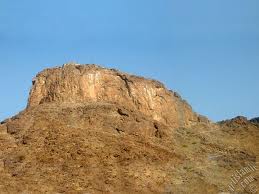His is one of the most intense accounts of an encounter with the divine ever recorded. For years, Muhammad ibn Abdallah took his family on a spiritual retreat during the holy month of Ramadan to Mount Hira outside the city of Mecca. This was a common practice for many in Muhammad’s culture, however Muhammad was no ordinary man with an ordinary destiny.
Muhammad, a successful merchant, had been spiritually restless for some time. His tribe, the Quraysh, and the city of Mecca were increasingly materialistic, idolizing their wealth and good fortune while they made supplications to various deities. As a merchant, Muhammad undoubtedly encountered many philosophies, faiths and cultures in his business travels, however he understood that unless his tribe overcame their ego and greed, the societal order of his people would fall apart.
Like many before him and since, Muhammad also sensed a spiritual void in his people. What was the right way, what was transcendent and above the greed and egotism? He often retreated to a cave on Mount Hira for private meditation and prayer on such matters. For years he searched, and when the divine answered it blew the hinges off Muhammad’s world.

In the darkness of the cave, a presence like no other overcame Muhammad and demanded that he “Recite!” Muhammad, stricken with terror, refused, saying “I am no kahin.” The kahin referred to the crazed soothsayers who claimed divine inspiration. But the presence, whom Muhammad identified as the angel Gabriel, enveloped him like a constricting serpent and demanded once more, “Recite!”
Muhammad refused one last time and the angel overtook him until Muhammad felt his very life force slipping away. Completely drained and overwhelmed, Muhammad’s next breath spoke the very first verse of the Qur’an:
“Recite in the name of thy Lord and Cherisher, who created man out of a germ cell. Recite, for thy Lord is Most Bountiful. He who taught the use of the pen, taught man that which he did not know.” Qur’an 96: 1-5
Muhammad was terrified. Had he become a despised kahin, possessed by the jinn (spirits who roamed and haunted the land)? Overtaken with grief and horror, Muhammad ran from the cave intent to hurl himself off the mountain to his death. According to Ibn Ishaq, one of Muhammad’s biographers, Muhammad recounts the episode thus:
When I [Muhammad] was midway on the mountain, I heard a voice from heaven saying, “O Muhammad! Thou art the apostle of God and I am Gabriel.” I raised my head towards heaven to see who was speaking, and lo, Gabriel in the form of a man with feet astride the horizon…I stood gazing at him, moving neither backward or forward; then I began to turn my face away from him, but towards whatever region of the sky I looked, I saw him as before.
He was locked into his destiny. Unlike many of the other prophets and sages of the world’s faiths, Muhammad fought with all his strength and even tried to kill himself to avoid his calling. The experience was that powerful and overwhelming. Later biographies of Muhammad describe how each revelation that came from Muhammad sent him into shock and terror, often sweating even in the cold. In short, when Muhammad referred to himself as the “slave of Allah,” he meant it.
In most cases, we are given a choice in life. Opportunity or destiny often knocks politely, but we can usually refuse the call. What Muhammad’s story show us is that our purpose, dharma, and destiny are not our own. Our designs are for service to others and any other account of “enlightenment” which serves the ego is, in my opinion, hubris.
Muhammad also teaches us that complete trust and surrender is required to fully engage our purpose and destiny. The path is not always easy, even when commissioned by the divine, but it is necessary. In this way, even in the face of fear and death, we must put the greater good, the greater purpose above ourselves.
Sometimes our own fears and limitations get in the way of our purpose or design. What are you putting above your calling? Are you allowing fear, doubt, or pride to cripple your purpose in life? What are you doing to overcome these difficulties?

